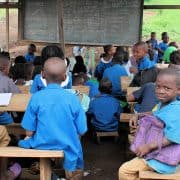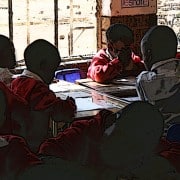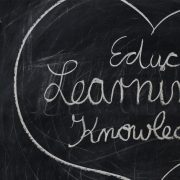|
Getting your Trinity Audio player ready...
|
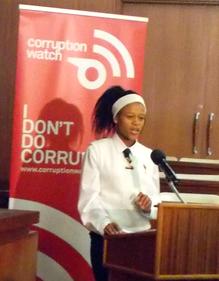 By Valencia Talane
By Valencia Talane
Young people of today should not look at themselves as leaders of tomorrow, but actually as leaders of today who are shaping the future.
David Lewis, Corruption Watch executive director, shared this message at a lively debate session that was the culmination of the Model Youth South Africa (MYSA) challenge. The event, a joint Corruption Watch and Debate Afrika initiative, was held at the University of the Free State (UFS) at the weekend.
The topic of the debate was whether South Africa should institute capital punishment on perpetrators of corruption as a measure to help win the war against the scourge.
“Corruption in schools might not involve huge sums of money,” said Lewis, “but it can mean the difference between a school getting that extra classroom or not, or a library.”
Taking the topic seriously
Teams of five learners from eight schools took part in the Parliamentary-style presentations that formed the final leg of the contest. At the end, one team won the overall competition, with prizes also going to winners of the video and policy essay part, as well as the best speaker.
These awards were given after adjudicators had heard arguments for and against the topic. It was team Scythe that took away the overall winner trophy and the grand prize – donated by Corruption Watch – of a new computer for their school. Ten teams were initially included in the challenge, but two of them could not take part in the debate phase and were therefore disqualified.
Chief adjudicator Zola Valashiya, of Debate Afrika, commended the hard work of the learners: “I thank you for taking this whole process seriously and making every effort to research your topics and to read as much on the topic as possible.”
He encouraged the learners to persevere with their school careers. “An education lends credibility to what you say – there’s a difference between an opinion and a studious opinion.”
Getting young people involved in issues that affect them
Debate Afrika, which started the initiative by engaging schools in the province, was launched in 2011 with the aim of organising young people and engaging them in important issues that affect their everyday lives.
“We’re extremely happy with how the event went,” said Valashiya. “We loved working with Corruption Watch and we hope we can do more in the future. Debate Afrika is eager to run MYSA with schools in other provinces.
“We wanted to hear what the youth had to say about issues which affect many of them every day,” he said, adding that his organisation also aimed to get them to continue raising awareness and engaging long after the MYSA competition was over.
“Don’t think that it ends here,” he told the learners. “As MYSA ambassadors you leave here today wiser than your peers on topics such as corruption.”
Debate Afrika opened up the invitation to all schools in the Free State, Valashiya told Corruption Watch. “We wanted as many schools to participate as possible, especially underprivileged schools. This programme is the first of its kind so we decided to run the pilot in the Free State.
“We received responses from over 20 schools all willing and excited to participate, but unfortunately, many of them as far as 200km from Bloemfontein could not afford to travel to the UFS for the launch.” It is his hope that future MYSA challenges will receive sponsorship to enable all who are interested to take part.
The UFS law student said not only does Debate Afrika have strong networks in all provinces across the country, but they also want to take this experience far and wide as soon as possible.
Building tomorrow’s leaders
The teams were first briefed in March on how the competition would be run and the composition of each team. In phase one they had to establish media campaigns with the theme My corruption-free school. Using their schools as the centre of their campaigns, the learners had to create public education material that included social media drives. They presented their interpretation of the theme to their communities, and also solutions to fight corruption in their schools.
One member of each team had to lead the process of the second phase, a policy essay, while another two would prepare speeches for the debate that marked the culmination of the competition.
“It’s very fitting that we met for the first time to discuss the challenge on Human Rights Day, and today on the eve of Freedom Day we celebrate by expressing our views on how best to eradicate corruption,” said Corruption Watch campaigns manager Ronald Menoe.
“Debate Afrika is also developing bigger and better programmes that will ensure the longevity of what we do, building tomorrow’s leaders today,” Valashiya said.
The Model Youth South Africa challenge in pictures:
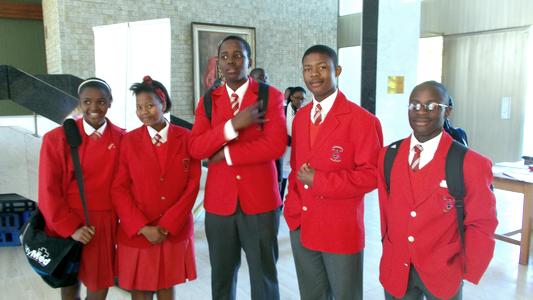 |


